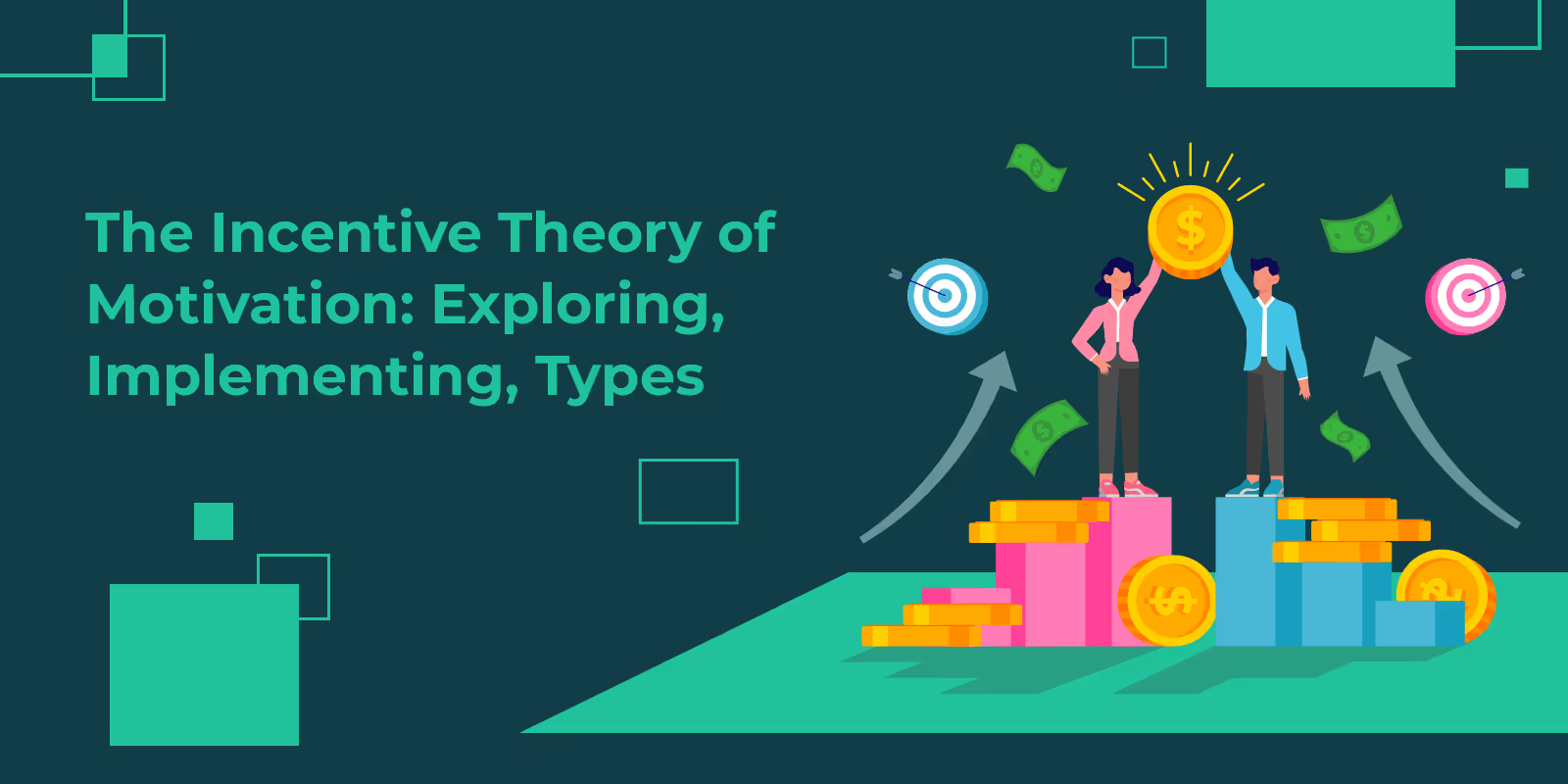
Blog
The Incentive Theory of Motivation: Exploring, Implementing, Types
April 15, 2024


Key Insights
It all started in 1938 when B.F Skinner published his book Behavior of Organism.
He theorized that all human behavior is a result of external stimuli and has nothing to do with internal factors.
For example, employees work hard not because they are driven to take the company to success. Rather their activities are motivated by the external stimuli called salary.
It is from this foundation created by the behavior school of thought the Incentive Theory of Motivation was postulated.
So what is this incentive theory? How is it relevant from a sales point of view? What are its various types? What are the challenges to incentive theory? Let's find answers to these questions and more.
What is Incentive Theory
Incentive theory suggests that people behave in a certain way due to the expectation of positive rewards or the fear of negative consequences. Rather than any internal drive, it is the external factor that influences them to behave in a particular way.
For example, an employee does his duties promptly for the reward of salary, incentive, or promotion and the fear of demotion or losing the job.
Incentive theory is applied in various fields including psychology, marketing, economics, etc. It explains how incentive programs can be made the best use of to motivate employees, increase productivity, ensure expected behavior, and achieve organizational goals.
How Incentive Theory Explains Motivation
Incentive theory provides a framework for understanding how motivation can be imbibed in employees to drive desired behavior and results.
Here is a list of ways incentive theory explains motivation:
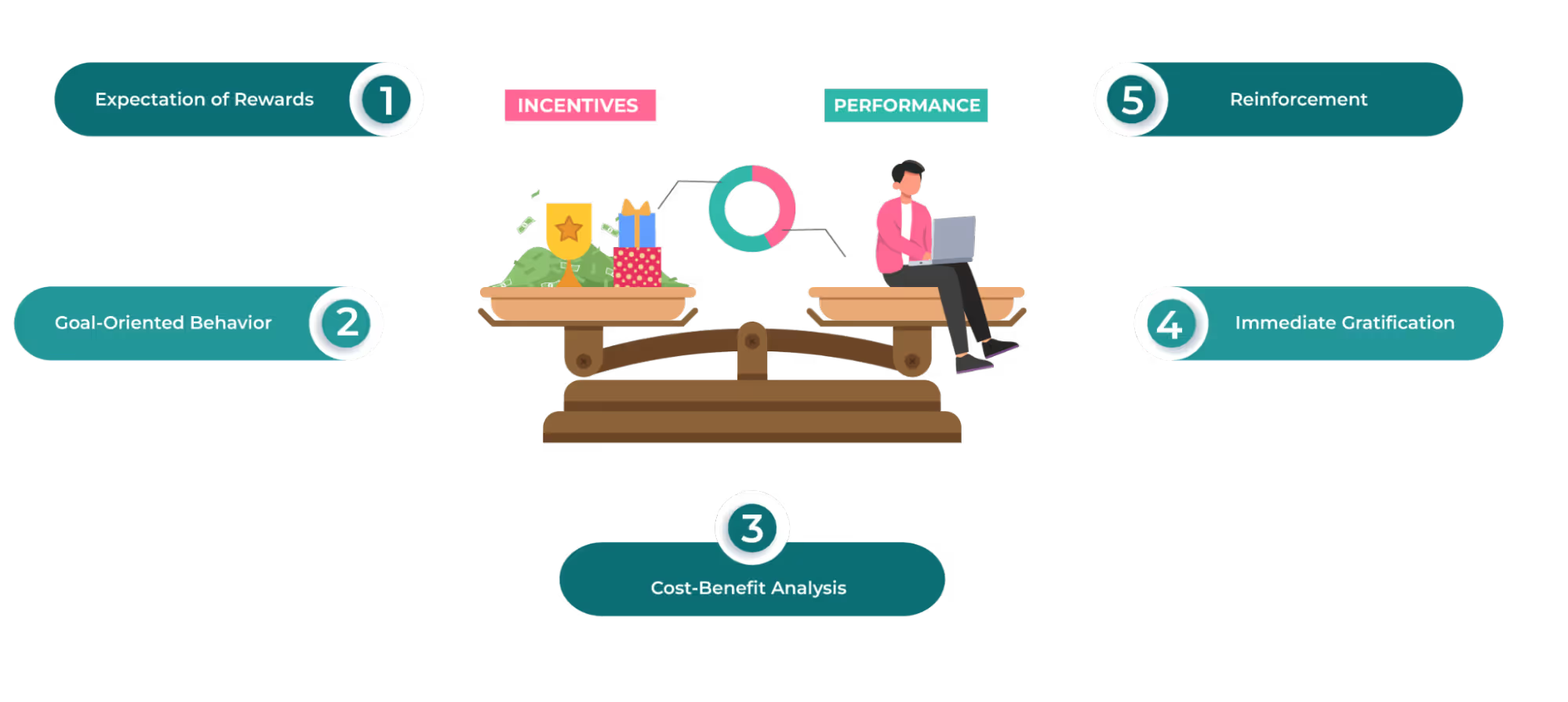
- Incentive theory proposes that employees can be motivated to show expected behavior when there is an expectation of reward. This reward can be monetary like increments, incentives, bonuses, etc, or non-monetary like awards, recognitions, or even praise of words.
- It suggests that people are goal oriented. They focus on achieving the positive results while avoiding the negative outcomes. Hence, their behavior will be to achieve positive outcomes and rewards.
- Incentive theory proposes that people make rational decisions based on the cost-benefit analysis. This means people will weigh between the effort put and the reward earned. They are more likely to do it if the reward is better than the effort.
- Incentive theory recognizes that people are focused on immediate gratification. Rather than a long-term goal, most people are motivated by rewards for short-term goals and immediate satisfaction.
- Incentives help in reinforcing positive behavior and desired outcomes. When people are rewarded for their actions, they will be motivated to repeat those behaviors in the future.
Hence, the incentive motivation model provides insights into how rewards and incentives can influence motivation and behavior in various contexts.
Types of Incentives and Examples
Incentives play a crucial role in the motivation, performance, and productivity of employees.
This incentive can be used as a positive reward to ensure desired behavior as well as to prevent negative consequences.
So, what are these positive and negative incentives? Let's look at the definition and examples in detail.

Positive incentives: These are rewards and benefits offered to employees to encourage positive behaviors and outcomes. It motivates employees, enhances engagement, improves performance, and ensures overall satisfaction.
For example, positive incentives can be tangible rewards like money, gifts, and vouchers. It can also be intangible rewards like career development opportunities, upskilling training, words of praise, etc.
Companies use a combination of these monetary and non-monetary rewards to ensure employees feel a sense of satisfaction and recognition of their achievements.
Negative Incentives: These types of incentives aim at discouraging certain behaviors in the workspace through punishments. Judiciously using negative incentives will help in creating a healthy work environment where employees comply with the rules and regulations without feeling dissatisfied.
An negative incentive example: when an employee’s action becomes undesirable, depending upon the intensity of the behavior, they can be demotivated, removed from promotions and increments, denied career development opportunities, or taken disciplinary action to the extent of losing their job security.
However, companies must be cautious when putting an employee through punishment. It must be done only through proper procedure and confirmation to ensure the penalty was justified.
Wish to know the incentive structure meaning? Check out Building Incentive Structures for Optimal Performance
Implementing Incentive Theory in Your Life and Career
Implementing incentive theory in your life and career will give you a sense of direction and purpose.
Having a list of short-term goals will help individuals work towards achieving these aims and achieving rewards for it will create a feeling of satisfaction about it.
Let's look at the step-by-step approach to applying incentive theory and spurring motivation in people:
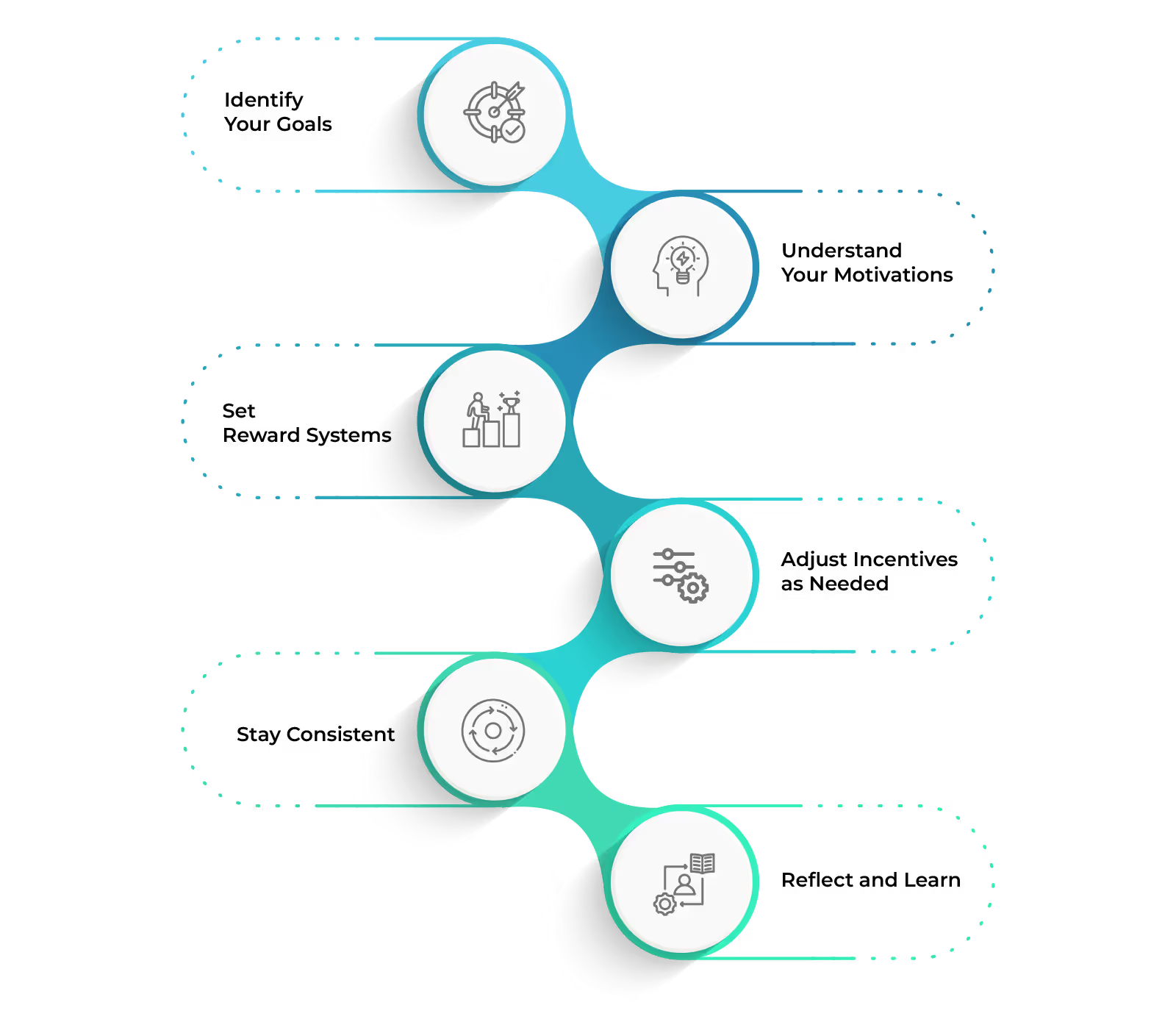
Identify Your Goals
Individuals must clearly define their short-term and long-term goals in life and career. These goals include health, relationships, career and skill development, financial achievement, etc.
Understand Your Motivations
Upon defining your goals, understand what drives you towards achieving these goals. Determining whether it is financial rewards, self-satisfaction, or public recognition that drives you, the incentive strategy can be accordingly modified.
Set Reward Systems
Rewarding yourself is crucial for consistently sustaining your motivation and successfully achieving your goals. If your goal is to exercise regularly, treat yourself to a cheat day or relaxing activity. When you have achieved a professional milestone, reward yourself with a small celebration or a day off.
Adjust Incentives as Needed
What motivates you can change depending on the progress of the goal or changing circumstances. Being flexible with your rewards and experimenting with various incentives will help in effectively sustaining your motivation to achieve the goal.

Stay Consistent
Consistency is the key to implementing incentive theory in your life and career. You must make a habit of appreciating and rewarding yourself for the goals you achieved to ensure you maintain the motivation and stay consistent in your journey towards achieving the goals.
Reflect and Learn
Regular evaluation is necessary to check the progress and effectiveness of the incentive strategy. This helps identify what is worded and understand the areas of improvement. Gathering these insights and learnings helps refine the incentive strategy and improve its effectiveness.
Taking a step-by-step approach toward achieving your goals will help in effectively motivating yourself, taking appropriate actions, overcoming challenges, and successfully achieving your goals.
Read more about how motivation is applied in group and individual incentives. Check Team Incentives vs Individual Incentives: A Comparison.
Incentive theory of motivation vs. goal-setting theory of motivation:
While both incentive theory and goal-setting theory explore motivation, they approach it from different angles. Incentive theory emphasizes the pull of external rewards, while goal-setting theory focuses on the push of internal desires and aspirations.
Incentive Theory: This theory posits that individuals are motivated to act based on the expectation of receiving a reward or avoiding punishment. The incentive itself becomes the driving force, influencing behavior. It's an external factor that pulls us towards a specific action. Think of it like a carrot dangling in front of a donkey – the carrot (incentive) motivates the donkey to move.
Goal-Setting Theory: This theory highlights the importance of setting specific, measurable, achievable, relevant, and time-bound (SMART) goals. It suggests that having clear goals motivates individuals to work towards them. The internal desire to achieve the goal becomes the primary motivator. It's an internal push that drives us forward. Imagine climbing a mountain – the desire to reach the summit motivates the climber.
Here's a table summarizing the key differences:
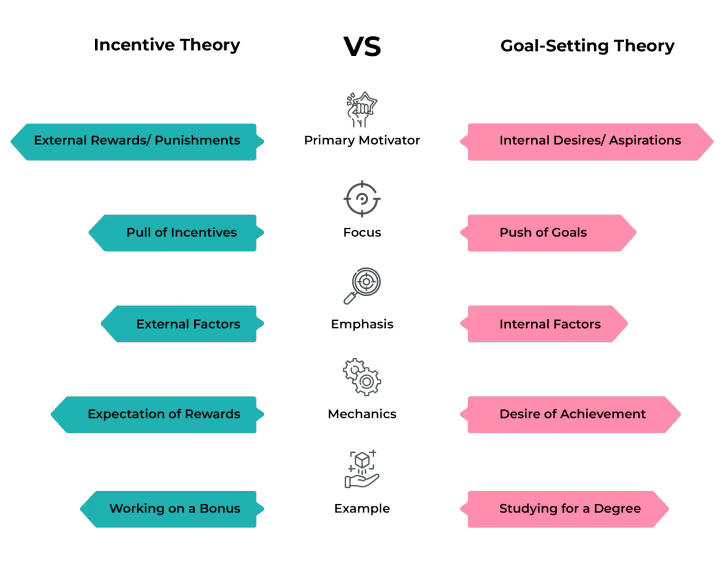
While seemingly different, these theories can complement each other. Incentives can be used to motivate individuals to pursue specific goals. For example, offering a bonus for achieving a sales target combines both incentive theory and goal-setting theory to enhance motivation. Understanding both theories allows for a more holistic approach to motivating individuals in various contexts.
Critiques and Challenges of Incentive Theory
Though incentive theory is very useful in motivating employees, it has a few setbacks and challenges that companies need to take into consideration.
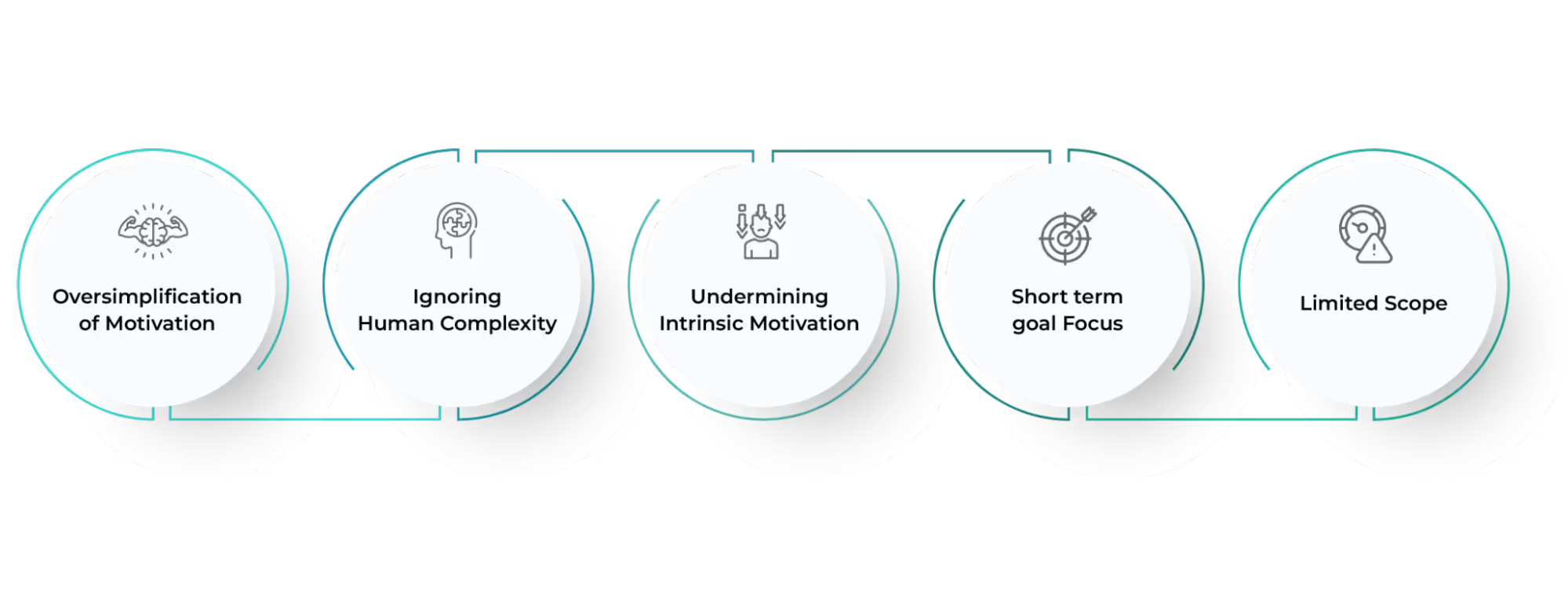
Oversimplification of Motivation
Incentive theory oversimplifies what drives human motivation. It reduces human actions just as a greed for rewards or fear of punishments. It does not consider other factors like cultural values, social norms, intrinsic motivation, etc.
Ignoring Human Complexity
Human beings are complex creatures. There are many examples from human history where people have done things without any expectation of reward or fear of punishment. There are more important things than mere selfish desires that drive human actions.
Undermining Intrinsic Motivation
When people are only driven by extrinsic motivation and rewards, they will lose the enjoyment of doing the task. For a longer period, only intrinsic motivation like passion, curiosity, and interest can drive people to do the work with dedication.
Short-term goal Focus
Incentive theory only focuses on short-term rewards and immediate gratification. This makes the decision-making process short-sighted without any consideration for long-term goals and future visions.
Limited Scope
Incentive theory has a limited scope of evaluating human motivation based on rewards and punishments. But the human scope is wider than that. People can engage in actions that go beyond self-interest for any gains or any rational calculation.
Incentive theory provides insights into how human behavior can be motivated based on rewards and punishments.
But its failure to consider human complexities, individual differences, and oversimplification makes it a theory to be questioned.
Conclusion: Empowering Your Motivational Journey
Picking yourself up, pushing yourself to achieve something, and finally succeeding in your journey is not a simple thing.
It requires great determination, dedication, and consistency.
What incentive theory does is guide an average person to achieve their goals and help them to stay focused in their journey.
Setting short-term goals, receiving rewards for achieving them, and steadily moving towards a longer and larger plan will motivate them to stay on track.
The incentive theory of motivation rightly postulates that individuals can be motivated to progress when offered rewards and recognition.
However, saying human motivation is solely based on the desire for money and gifts or fear of punishment might be an oversimplification.
Especially in sales, where consistent sales performance must be ensured, incentive theory examples will help provide the necessary environment for enhanced performance and productivity.
Incentives in the form of commissions, bonuses, profit shares, paid time off, etc will help sales reps stay focused on their sales quotas, strategize effectively, and achieve their on-target earnings.
Kennect offers cutting-edge solutions that automate your entire sales incentives process, saving you time and ensuring accuracy. No more spreadsheets, no more errors – just efficiency.
To know more about our product, visit https://www.kennect.io/ or Book a Demo NOW!
ReKennect : Stay ahead of the curve!
Subscribe to our bi-weekly newsletter packed with latest trends and insights on incentives.
Thank you! Your submission has been received!
Oops! Something went wrong while submitting the form.
Your data is in safe hands. Check out our Privacy policy for more info















